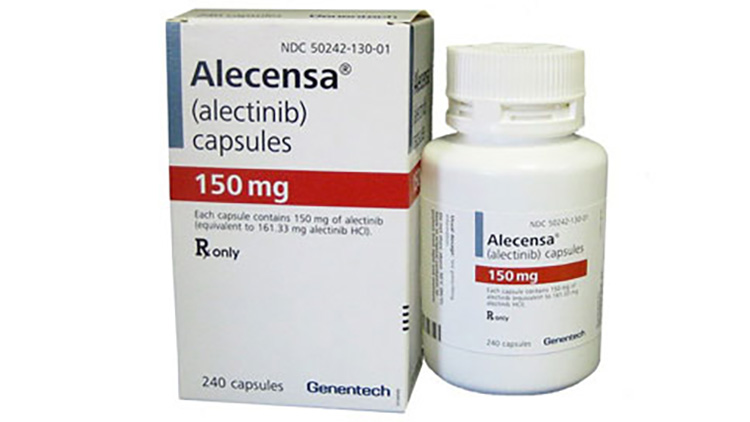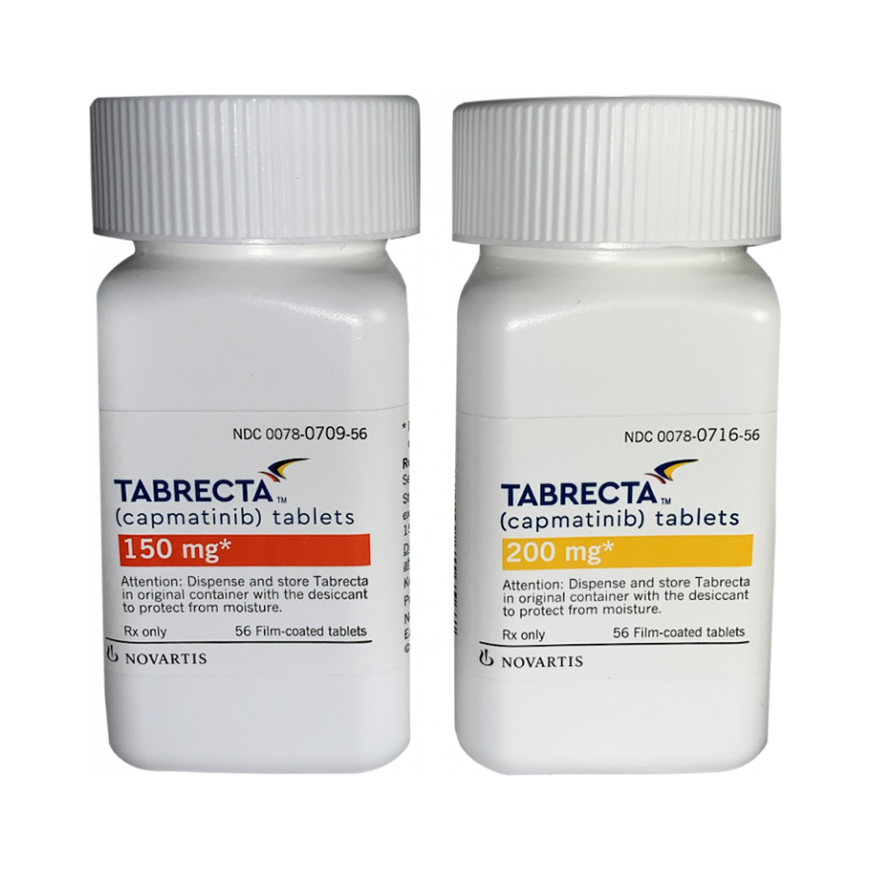Alecensa (alectinib) vs Tabrecta (capmatinib)
Alecensa (alectinib) vs Tabrecta (capmatinib)
Alecensa (alectinib) is an oral medication specifically approved for the treatment of ALK-positive non-small cell lung cancer (NSCLC), targeting the anaplastic lymphoma kinase gene mutation. Tabrecta (capmatinib), on the other hand, is designed to treat NSCLC in patients with mutations leading to MET exon 14 skipping, a different genetic alteration. When choosing between Alecensa and Tabrecta, it is essential for a patient to undergo molecular testing to determine the specific genetic mutation present in their cancer, as this will dictate which medication is appropriate for their condition.
Difference between Alecensa and Tabrecta
| Metric | Alecensa (alectinib) | Tabrecta (capmatinib) |
|---|---|---|
| Generic name | Alectinib | Capmatinib |
| Indications | ALK-positive non-small cell lung cancer (NSCLC) | MET exon 14 skipping mutated non-small cell lung cancer |
| Mechanism of action | ALK inhibitor | MEK inhibitor |
| Brand names | Alecensa | Tabrecta |
| Administrative route | Oral | Oral |
| Side effects | Fatigue, constipation, edema, myalgia, anemia | Nausea, vomiting, fatigue, edema, decreased appetite |
| Contraindications | Hypersensitivity to alectinib or any of the excipients | Hypersensitivity to capmatinib or any of the excipients |
| Drug class | Tyrosine kinase inhibitor | Tyrosine kinase inhibitor |
| Manufacturer | Genentech (Roche) | Novartis |
Efficacy
Alecensa (Alectinib) Efficacy in Lung Cancer
Alecensa (alectinib) is a medication specifically indicated for the treatment of non-small cell lung cancer (NSCLC) characterized by an abnormal anaplastic lymphoma kinase (ALK) gene. The efficacy of Alecensa was demonstrated in several clinical trials, where it was shown to be effective in patients with ALK-positive NSCLC. In a pivotal phase III trial known as the ALEX study, alectinib significantly improved progression-free survival compared to crizotinib, which was a standard treatment at the time. Patients treated with Alecensa had a lower risk of disease progression or death and experienced fewer severe side effects. Additionally, Alecensa has shown high central nervous system (CNS) activity, offering a significant reduction in the risk of CNS progression in patients with ALK-positive NSCLC.
Tabrecta (Capmatinib) Efficacy in Lung Cancer
Tabrecta (capmatinib) is another targeted therapy approved for the treatment of adult patients with metastatic NSCLC harboring mesenchymal-epithelial transition (MET) exon 14 skipping mutations. The approval of Tabrecta was based on the results of the GEOMETRY mono-1 trial, which was a multicenter, non-randomized, open-label, multi-cohort study. In this trial, capmatinib demonstrated a high overall response rate (ORR) in previously treated as well as treatment-naïve patients with MET exon 14 skipping mutated NSCLC. The responses were durable, and the treatment was generally well tolerated, with manageable side effects.
Comparative Considerations
While both Alecensa and Tabrecta are used in the treatment of specific types of NSCLC, they target different genetic alterations and are not directly comparable. Alecensa targets ALK rearrangements, whereas Tabrecta targets MET exon 14 skipping mutations. The selection of either medication is contingent upon the molecular profile of the lung cancer, which is determined through biomarker testing. It is important for patients to undergo appropriate genetic testing to identify these mutations and determine the most effective treatment course.
Conclusion
In conclusion, both Alecensa and Tabrecta have shown significant efficacy in treating their respective subsets of NSCLC patients. Alecensa has become a preferred option for ALK-positive NSCLC due to its favorable efficacy and safety profile, especially in terms of CNS involvement. Tabrecta has emerged as a promising treatment for patients with MET exon 14 skipping mutations, offering a new avenue of hope for this particular group. As with all cancer treatments, the efficacy of these drugs can vary from patient to patient, and treatment decisions should be made on an individual basis, taking into account the molecular characteristics of the tumor, the patient's overall health, and other relevant factors.
Regulatory Agency Approvals
Alecensa
-
European Medical Agency (EMA), European Union

-
Food and Drug Administration (FDA), USA

-
Health Canada

-
Pharmaceuticals and Medical Devices Agency (PMDA), Japan

-
Therapeutic Goods Administration (TGA), Australia

-
Medsafe (NZ)

Tabrecta
-
European Medical Agency (EMA), European Union

-
Food and Drug Administration (FDA), USA

-
Pharmaceuticals and Medical Devices Agency (PMDA), Japan

Access Alecensa or Tabrecta today
If Alecensa or Tabrecta are not approved or available in your country (e.g. due to supply issues), you can access them via Everyone.org.
How it works

Make an enquiry
Choose the medicine you want to buy, answer a couple of questions, and upload your prescription to speed things up. We’ll get back to you within 24 hours.


Make an enquiry
Choose the medicine you want to buy, answer a couple of questions, and upload your prescription to speed things up. We’ll get back to you within 24 hours.


Breeze through the paperwork
We'll guide you through the required documents for importing unapproved medicine, ensuring you have all the necessary information.


Get a personalized quote
We’ll prepare a quote for you, including medicine costs and any shipping, administrative, or import fees that may apply.


Receive your medicine
Accept the quote and we’ll handle the rest - sourcing and safely delivering your medicine.

Some text on this page has been automatically generated. Speak to your physician before you start a new treatment or medication.
Let's talk
If you have any questions, call us or send us a message through WhatsApp or email:
Contact us




